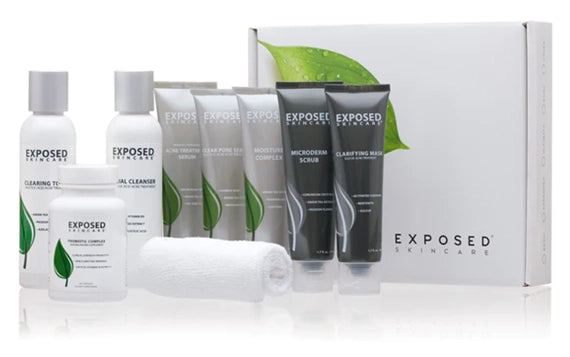The quest for clear, blemish-free skin often leads down the road of innovative skincare solutions. One innovation that has sparked debate is the use of a liquid bandage for acne.
Initially designed to protect minor wounds and burns, liquid bandages have found their way into the acne treatment. But is this a skincare hack you should be considering? Here’s why relying on liquid bandages for acne might not be ideal.
Also read: How to choose the best acne treatment
Biggest Take-Aways:
- Liquid bandages are unsuitable for acne treatment because they can trap bacteria, increase inflammation, and interfere with the skin's natural healing process.
- These bandages can cause issues with makeup application and may lead to skin irritation or allergic reactions, especially in sensitive skin types.
- Alternatives like hydrocolloid bandages and targeted acne treatments are more effective and safer for managing acne.
- Exposed Skin Care is an excellent alternative, offering a balanced approach with its multi-step regimen and combination of scientific and natural ingredients.
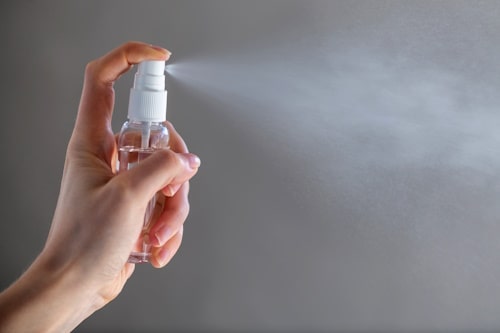
Understanding Liquid Bandages: A Quick Overview
Liquid bandages are topical products applied to the skin to create a protective, adhesive layer, much like a traditional band-aid but in a liquid form. It’s designed to seal wounds, prevent infections, and allow the skin to heal. But when it comes to acne, the story changes.
Why Liquid Bandage for Acne Isn't Recommended
1. Potential to Aggravate Acne Inflammation
Inflammation and Irritation
- Trapping Bacteria: Liquid bandages are designed to seal off wounds. However, when used on acne, they can trap bacteria under the skin, exacerbating the issue.
- Increased Inflammation: By creating an occlusive layer, liquid bandages can increase inflammation around the pimple, making it more prominent and painful.
Skin's Natural Healing Process
- Interference with Healing: Acne isn’t a typical wound. It's an inflammation response that requires the skin to breathe and expel content, which liquid bandages might impede.
2. Adverse Reactions and Skin Sensitivities
Ingredient Concerns
- Harsh Chemicals: Many liquid bandages contain chemicals like acrylates and alcohol, which can irritate and dry out the skin, especially sensitive acne-prone skin.
- Allergic Reactions: There's a risk of allergic reactions to some ingredients found in liquid bandages, leading to more skin problems.
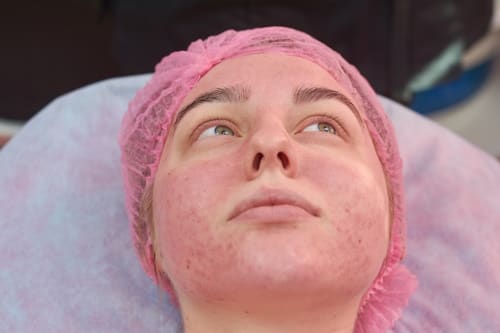
Reaction with Acne Treatments
- Incompatibility with Acne Products: Liquid bandages might react adversely with common acne treatment actives like salicylic acid or niacinamide, reducing their effectiveness or causing skin irritation.
3. Impact on Skin’s Appearance and Feel
Aesthetic Downside
- Visible Texture: Unlike invisible or hydrocolloid acne patches, liquid bandages can leave a shiny or crusty film, making the acne more noticeable.
- Difficulty with Makeup Application: Applying makeup over a liquid bandage is challenging. It can create an uneven surface, making concealers and foundations look patchy.
Sensory Discomfort
- Feeling of Tightness: Liquid bandages dry to form a tight film, which can be uncomfortable on sensitive acne spots.
- Issues with Removal: Removing a liquid bandage from an acne blemish can be painful and might cause the pimple to rupture prematurely.
4. Risk of Delayed Healing and Scarring
Healing Process
- Slow Down Natural Recovery: The skin’s natural healing process might be slowed down, leading to prolonged redness or hyperpigmentation.
- Potential for Scarring: Incorrect application or removal of liquid bandages can lead to skin trauma, increasing the risk of acne scars.
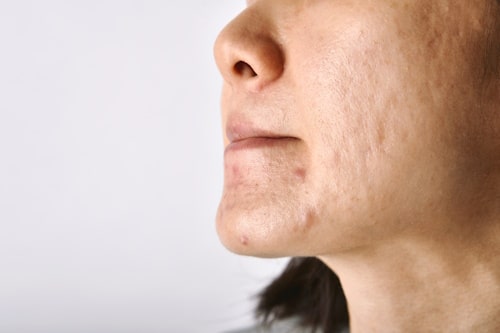
Long-Term Skin Health
- Cumulative Damage: Repeated use of liquid bandages on acne can lead to cumulative skin damage, affecting long-term skin health.
- Barrier Function Disruption: Overuse might disrupt the skin's natural barrier function, making it more susceptible to infections and inflammation.
Alternatives to Liquid Bandage for Acne
While liquid bandage for acne isn’t recommended, many effective and safer alternatives exist.
Hydrocolloid Bandages
- Gentle and Effective: These bandages absorb excess fluid, protect the blemish, and create a moist environment for faster healing.
- Invisible and Comfortable: Many brands offer thin, barely-there patches that are comfortable to wear and can be used under makeup.
Targeted Acne Treatments
- Treatment Actives: Products containing salicylic acid, benzoyl peroxide, or tea tree oil can help treat acne effectively without damaging the skin.
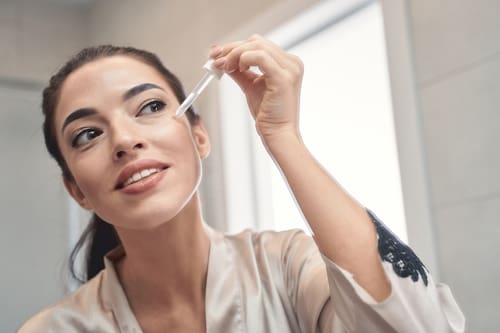
- Spot Treatments: Spot treatments target individual pimples, reducing inflammation and speeding up recovery.
Skincare Routine Adjustments
- Gentle Cleansing: Use a mild, non-comedogenic cleanser to keep the skin clean without over-drying.
- Moisturizing: Hydrating the skin helps maintain its barrier function and reduces the chances of acne flare-ups.
Lifestyle Changes
- Diet and Hydration: A balanced diet and adequate hydration can significantly impact skin health.
- Stress Management: Reducing stress through activities like yoga or meditation can help lower the incidence of breakouts.
The Benefits of Using Exposed Skin Care for Acne Management
Exposed Skin Care has carved a niche as an effective solution for managing acne. It offers innovative products to battle any type of acne.
Here’s why it stands out:
- Comprehensive Treatment: Exposed Skin Care offers a multi-step regimen that includes cleansing, toning, and treating acne. This comprehensive approach ensures that all aspects of acne management are addressed.
- Ingredients That Work: The products are formulated using scientific and natural ingredients. This unique combination helps in effectively treating acne without causing excessive dryness or irritation.
- Hydration for Dry Skin: Unlike many harsh acne treatments, Exposed Skin Care includes components that hydrate and nourish the skin, making it a suitable option even for those with dry skin issues.
- Easy-to-Use Packaging: The products come in user-friendly packaging, often in a tube form, making it easy to dispense the right amount without waste.
- Prevents Acne Scars: Regular use helps not only treat existing acne but also prevent future breakouts, which can reduce the urge to pick at blemishes, thereby preventing scars.
Exposed Skin Care is a prime choice for many looking for a reliable acne treatment solution.
Conclusion
The quest for an effective acne solution often leads us through a maze of products and trends. Seven years ago, the hype around using an invisible bandage for acne might have seemed like a clever trick, but testing and experience have shown that it's not the ideal solution.
These bandages can act as a barrier but can’t adequately soothe skin or prevent bacterial infection. Acne management is more than just trying to hide blemishes or treating mild skin abrasions.
It’s about finding a method that works harmoniously with your skin for makeup application and overall health. Pimple patches and other targeted treatments have emerged as a better alternative, offering a clear topcoat-like protection without the downsides of a liquid bandage.
When considering acne treatments, remember that nothing on the market works like a magic wand. Patience and consistent care are key. Products like Exposed Skin Care have proven their efficacy over time, offering a balanced approach to acne treatment without the hype.
They serve not just as a bandage but as a primer to healthier skin, making them a valuable addition to your beauty shop list. In conclusion, while the allure of quick fixes is strong, we’re better off investing in reliable, tested solutions for acne care. That’s the real secret to achieving and maintaining clear, healthy skin.
FAQs
Can I use a liquid bandage on acne instead of a regular pimple patch?
No, using a liquid bandage on acne is not advisable. It can trap bacteria, aggravate inflammation, and interfere with healing.
Are there any skin types that should avoid liquid bandages completely?
Yes, individuals with sensitive or acne-prone skin should avoid using liquid bandages, as they can cause irritation and exacerbate skin issues.
How do liquid bandages affect the application of makeup on acne?
Liquid bandages can create an uneven surface on the skin, making the application of makeup, like foundation or concealer, difficult and patchy.
Can using liquid bandages on acne lead to scarring?
Yes, improper use or removal of liquid bandages on acne can cause skin trauma, potentially leading to scarring.
Is Exposed Skin Care a good alternative for acne treatment?
Yes, Exposed Skin Care is an effective alternative for acne treatment. It offers a comprehensive approach, combining scientific and natural ingredients that are gentle on the skin and effective in managing acne.










